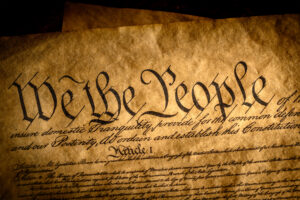By Toni Hedstrom

Democracy: A system of government by the whole population or all the eligible members of a state, typically through elected representatives.1
Republic: A state in which supreme power is held by the people and their elected representatives and which has an elected or nominated president rather than a monarch.2
Who ‘We’ Are
Who we are and who we were meant to be in the drafting of the Constitution of the United States appears grayer than ever in the 21st century polarized society we live in.
Most of us have grown up believing that our voices matter and that we can make a difference in our country’s direction through voting. However, trust is breaking, with American society increasingly choosing political parties over true policy choices.
To begin this study, we must identify who ‘we’ are as stated in the Constitution. Ironically, the original text of the constitution never mentions the word democracy, a realization noted by Essayist Jay McConville in his essay, “Republic or Democracy?”3
“The original text of the United States Constitution never mentions the word democracy, and only mentions republic as a form of government once in Article IV, Section 4, where the clause refers to the states and not the federal government itself,” McConville writes.
History shows that our founding fathers found fault in the Constitution, and all who signed it did so with some level of compromise. What had been written was deemed “with all its faults” better than likely alternatives.
Thus, our constitutional foundation is imperfect and held together with hope and the belief that we, as a nation, could maintain some sort of national cohesion and consensus.
In an article entitled “Perspectives on the Constitution: A Republic, If You Can Keep It” Richard R. Beeman, Ph.D. writes, “This national cohesion is represented by a common language; a solid belief in the principles of English common law and constitutionalism, a widespread commitment (albeit in diverse forms) to the Protestant religion; a shared revolutionary experience; and, perhaps most important, an economic environment which promised most free, white Americans if not great wealth, at least independent sufficiency.”
Thankfully, our country, during its young life, has managed to acknowledge all American citizens as deserving of this promise, not just free, white Americans.
In 21st century America, these principles are tearing us apart. Our common language is in question, our principles of common law are diverse, the emphasis on religion has been lost by many, twisted into a perverse preference for theocracy by others, and we have very different concepts of “revolutionary experience.”
Protecting Our Republic
Most scholars believe America is a true republic managed by democratic policy. We, the people, have the right to vote on government and policy matters, but mostly at our local level. For higher government, we vote for representatives to take our positions. Thus, many citizens always feel their voices have not been heard.
Understanding where and how Americans receive the information needed to make informed decisions in policy through voting is a fearful concept. Our country’s news sources have become overwhelmingly polarized. The news is presented from a perspective of personal ideology, lacking unbiased reporting of facts.
This has exacerbated the deterioration of trust the public once held in its news sources. Now, instead of unbiased news, Americans choose their “team” by choosing their news source. In other words, we can tune in to the channel that tells us what we want to hear, not what we need to hear. This is called “confirmation bias”, and it’s a term you’ve probably heard thrown around a lot lately.
Survival of the American Dream
Benjamin Franklin, in signing the Constitution of the United States, was concerned about preserving the union. He and others foresaw the challenge of keeping the union together.
Jay McConville writes, “To keep the union together required a structure that limited conflict and cooled the passions of the mob yet provided ample enough rights and liberties to both the citizens and to the former colonies to make them support and adhere to the union.”3
Yet, just 85 years after the ratification of the Constitution, the United States would break into a deadly civil war over the inability to please polarized ideologies.
How do we keep the American dream alive and maintain our sense of “We the People” in the current polarized environment?
It starts with being informed, which is a responsibility each American citizen holds. We must look beyond the headlines and attempt to understand our political candidates’ bigger picture and direction. We must ask and understand what they will do on our behalf in this Republic we have built.
_________________________
1 2 Definitions from Oxford Languages